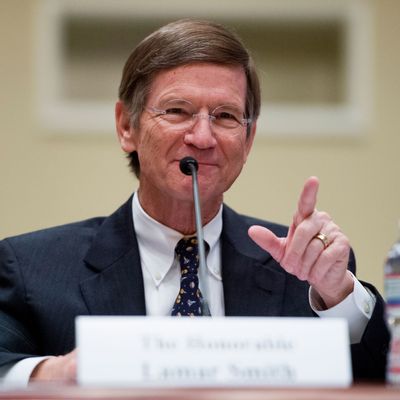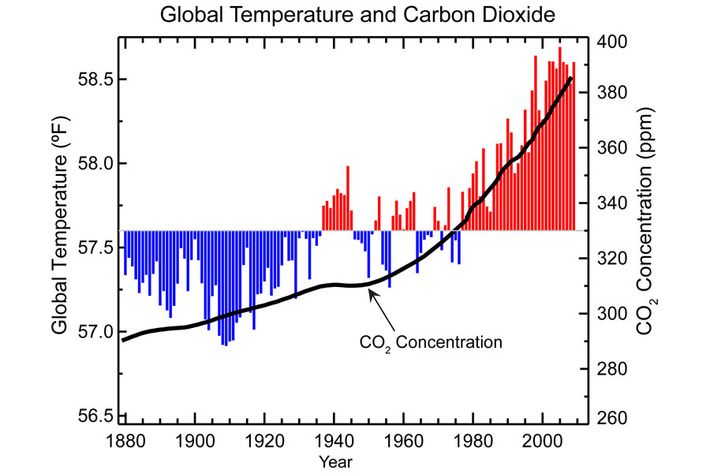
Though it was surely not his intention to do so, David Brooks’s column today has made an airtight case for why no sane person would support any Republican candidate for president next year. Brooks begins his column by conceding that climate-science deniers have a hammerlock on public discourse within the party. “On this issue the G.O.P. has come to resemble a Soviet dictatorship,” he writes, “a vast majority of Republican politicians can’t publicly say what they know about the truth of climate change because they’re afraid the thought police will knock on their door and drag them off to an AM radio interrogation.” Brooks uses this observation as a launching point to tout glimmerings of moderate (or, at any rate, less extreme) thought within the party. But let’s instead linger for a moment on the ideological commissars who prevent Republicans from acknowledging scientific reality. That sounds kind of important.
In fact, as terrifying as the reality depicted by Brooks may sound, matters are actually worse. Brooks presents the situation as a “vast majority” of GOP politicians that understand climate science cowed into submission by an angry minority. Perhaps the vast majority of Republican politicians who confide their private beliefs to Brooks feel this way, but this is probably not a representative cross section. It is clear that a large proportion of party elites proclaim themselves to be climate-science skeptics for reasons purely of their own volition. Nor is this sentiment confined to talk-radio shouters. Esteemed chin-strokers and collectors of awards, like George F. Will and Charles Krauthammer, broadcast their disdain for the findings of the climate-science field.
The rise of Trump, and his increasingly cartoonish lies, has framed the Republican Party as split between the Establishment and the kooks. But on the climate issue, at least, the kooks are the Establishment. The “sophisticated” arguments about climate change that appear in prestigious conservative organs contain childish ignorance. Here is a typical example at hand in Wall Street Journal columnist Bret Stephens’s offering today, which dismisses climate change as an imaginary problem. “The hysteria generated by an imperceptible temperature rise of 1.7 degrees Fahrenheit since 1880—as if the trend is bound to continue forever, or is not a product of natural variation, or cannot be mitigated except by drastic policy interventions. The hyping of flimsy studies—melting Himalayan glaciers; vanishing polar ice—to press the political point.”
Here, via the National Oceanic and Atmospheric Administration, is a depiction of that wee 1.7-degree increase. This is Stephens’s idea of “natural variation” that is going to stop on its own:

Even though scientists discovered more than a century ago that carbon dioxide traps heat, and even though rising concentrations of CO2 have corresponded to steadily rising temperatures, Stephens believes — in the face of the firm scientific consensus — that continuing to increase greenhouse-gas levels in the atmosphere will not cause temperatures to rise. Climate scientists believe that current policies, if not altered, will yield a projected temperature increase of 8.1 degrees Fahrenheit by the end of the century. Stephens, confident the trend will stop on its own, concludes his column predicting that, in 2115, “temperatures will be about the same.”
Of course, refuting climate-science skepticism with NOAA data runs into the problem that Republicans reject NOAA data. House Science Committee chairman Lamar Smith has used his power to accuse federal scientists of falsifying climate data. Smith has no evidence to support his charge, but the accusation is in keeping with the conservative belief that the theory of anthropogenic global warming is the product of a vast conspiracy among thousands of scientists worldwide to enrich themselves. (The chairman of the Senate’s environment committee is a fellow subscriber to this theory.) The theory is just as bonkers as the belief that the government faked the 9/11 attacks or the moon landings, with the main difference being that it informs a first-order public policy question and is also accepted doctrine within one of the two major American political parties.
Parties operate by coalescing around mutually agreeable policies. The presidential nominee may downplay the most outlandish anti-scientific conspiracy theories, but the party’s agenda will have to accommodate the beliefs expounded by the likes of Smith, Inhofe, Will, Krauthammer, Stephens, and many others. By November of next year, Brooks will no doubt have persuaded himself that the GOP’s embrace of pseudoscientific lunacy provides less of a disqualification than whatever combination of character flaws he has identified in Hillary Clinton. But if you’re voting Republican next year, you’re either getting somebody who is a member of the climate thought police or is afraid to disagree with them.






























